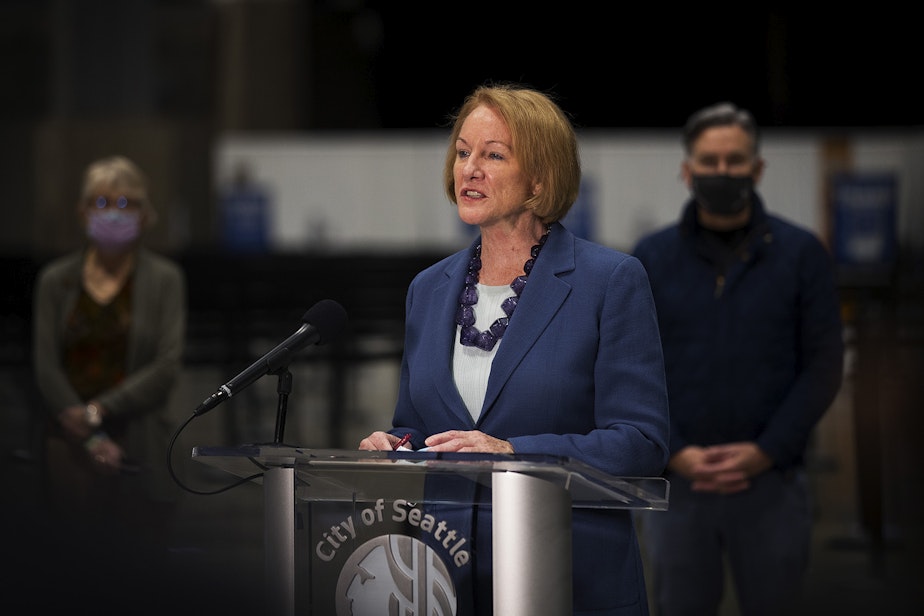We asked for Mayor Jenny Durkan's text messages, and this is what we got

It was June 2020, and Seattle Police’s East Precinct was a flashpoint as protestors called for police reform.
Then, without warning, Seattle police packed up and left the precinct.
We wanted to find out what led to this decision, and who exactly made the call to vacate the East Precinct. So we submitted a records request for six days of Mayor Jenny Durkan’s text messages, incoming and outgoing, from June 5 to June 10.
What we received five months later were not the mayor’s text messages, but a recreation of some of those messages that appear to have been taken from the cell phones of Stephanie Formas, chief of staff, and Michael Fong, deputy mayor.
The texts the Mayor's Office supplied are all innocuous, referencing various media stories, and meetings with Seattle journalists.
"Can you call Kroman and tell him I would appreciate a few more minutes of his time," the mayor texted, referencing David Kroman, a reporter with Crosscut. "After reading one of his stories there are some things he did not know to ask about."
Sponsored
There's also a touch of snark aimed at Kshama Sawant, a city councilmember.
"Large group led by Kshama Sawant is in the City Hall lobby / no issues," writes Carmen Best, former police chief.
"Her first time at work since February 28," Durkan retorts.
Other messages touched on protests and crime happening in Seattle.
Copies of these texts are in the slideshow below. Scroll through to read.
Sponsored
While these text conversations include the mayor, they did not fulfill the records request filed in June. No one in the records office alerted KUOW about what would be later dubbed “recreated texts” by the Seattle Ethics & Elections Commission, after a whistleblower complaint.
But there was an anonymous email that came in early April 2021.
“You had requested a week’s worth of Mayor Durkan’s texts for June 5 through 10th,” the email began. “The texts you received were not actually Durkan’s texts. They were recreated from other staff members' phones because the Mayor’s texts are gone.”
The email continued: “Under the PRA they are supposed to ask your permission first before they recreate records. They were hoping that you wouldn’t notice. I would ask them to reopen your request and provide you the records you asked for. I hope this is helpful. I don’t like to see this blatant disregard for transparency and I think it’s wrong.”
Sponsored
KUOW called and emailed Kimberly Ferreiro, the records officer handling the request, left a voicemail for the Mayor’s Office, and then appealed the records request. Weeks later, a response came from Michelle Chen, Ferreiro’s boss, and general legal counsel for the Mayor’s Office.
Chen wrote that over the past two years, Mayor Durkan has had multiple phones replaced, and that the mayor’s last phone backup did not have the records for the specific date range of my request.
The request was made on June 12, which made this explanation a little dubious, given that it was a two-day window for the mayor to lose her texts. The records department wouldn’t discover the missing texts until August 2020, however.
The city conducted a forensic analysis, Chen wrote, and identified the people the mayor texted or received messages from. The city could provide me text messages from the mayor’s phone from June 25, 2020, to present, she said.
Last week, The Seattle Times wrote about the whistleblower complaint and subsequent investigation that found that Chen had violated the Public Records Act. The Times also discovered that Fire Chief Harold Scoggins’ messages and former Police Chief Carmen Best’s messages from that time have also gone missing.
Sponsored
The whistleblowers were records officers Stacy Irwin and Kimberly Ferreiro, who spoke out in March.
Irwin and Ferreiro told the Ethics & Elections Commission that Chen directed them not to inform requesters that the mayor’s text messages were missing, and that the city was instead producing copies of messages gathered from other employees’ phones, in their conversations with the mayor.
They said Chen directed them to narrowly interpret 48 records requests, so that the mayor’s text messages wouldn’t be included, and they wouldn’t have to disclose that 10 months of the mayor’s texts were gone.
They said Chen proposed altering the “recreated” text messages, to hide that they didn’t come from the mayor’s device. The investigation found Chen did not do this.
Although Chen violated the Public Records Act when she narrowed the scope of the records requests, she did not violate laws when she failed to inform requesters that they received “recreated” messages, the investigation found.
Sponsored
Ferreiro has left the mayor’s office, said Wayne Barnett, executive director of the Seattle Ethics & Elections Commission. Irwin is on extended leave.
When asked if there would be repercussions for Chen, Barnett said the commission’s role is to issue the report and “if there are consequences for Ms. Chen, they will come from her employer.”
A spokesperson with the Mayor's Office said that Julie Kipp, the Citywide Public Disclosure Program Manager will be responding to records requests in the Mayor’s Office, and that the department has hired someone to work on fulfillment of public records requests on a daily basis.
Mayor Durkan, the spokesperson said, will consult with the City Attorney's office to determine what steps must be taken in response to the report.




